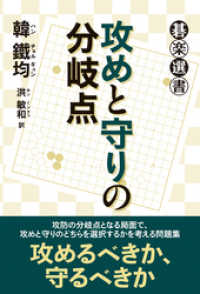- ホーム
- > 洋書
- > 英文書
- > Politics / International Relations
Full Description
The authoritarian regime in China is a prime target of the US-led war on autocracy; however, the regime claims a majority of the Chinese people trust the government, with national surveys since the 1990s supporting this assertion. How much do Chinese citizens actually trust the one-party regime? Instead of dismissing survey results, Li examines the contexts in which Chinese citizens are predisposed to say they trust the government. He argues that political trust in China is a power-accommodating and nonbinding hope rather than a rights-based and binding expectation as Chinese citizens do not have the right to grant and retract trust through free and fair elections.
Contents
List of Illustrations
Acknowledgments
1. Introduction
2. Definition Interpersonal Trust
Political Trust
The Chinese Variant
Conclusion 3. Measurement Two-Dimensional Measurement
Evidence from Local Surveys
Evidence from National Surveys
Conclusion 4. Construction Three-Pronged Strategy
Empirical Evidence
Conclusion 5. Effect on Political Participation Voice, Petition, and Defiance
Data, Hypotheses, and Models
Findings and Discussions
Conclusion 6. Implication for System Support Measuring Diffuse System Support
Popular Election of the President
Acceptance of the One-Party Rule Conclusion 7. Conclusions
Appendix 1. Survey Data
Appendix 2. Variable Descriptions
Appendix 3. A Note on Measurement
References
Index








